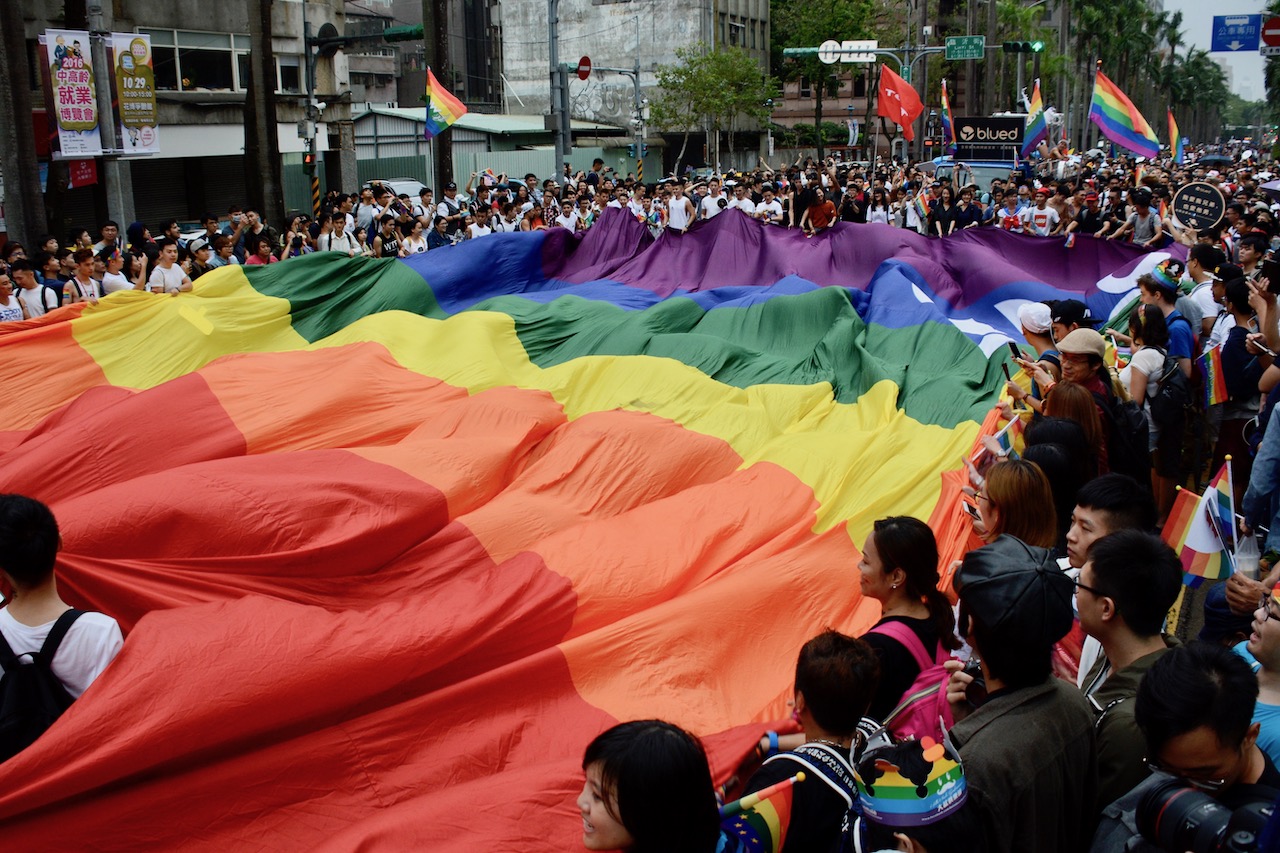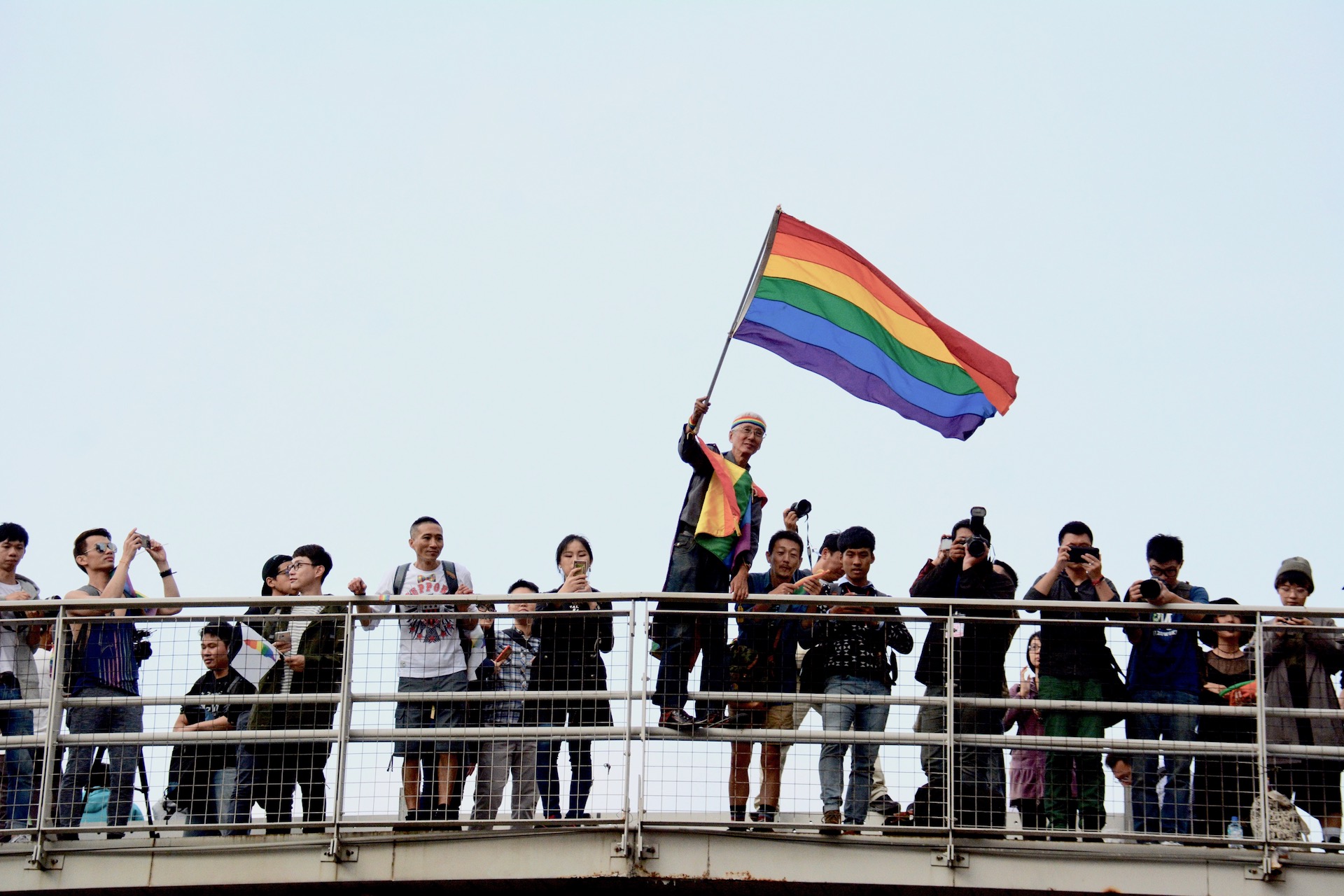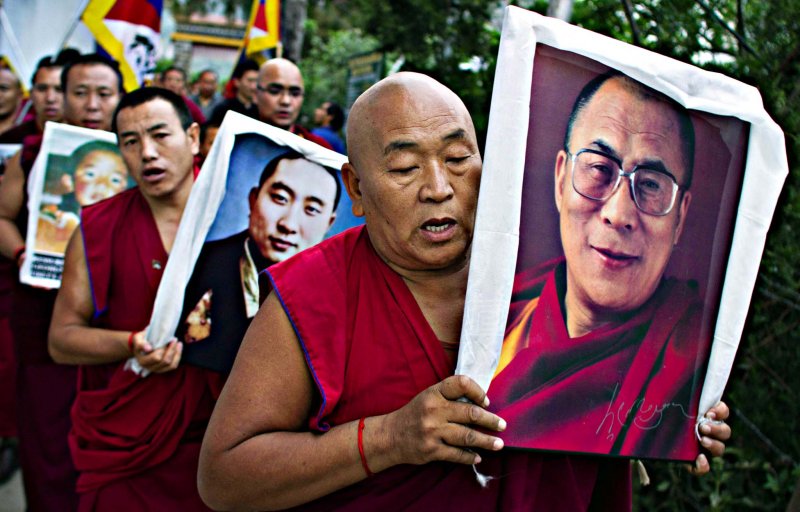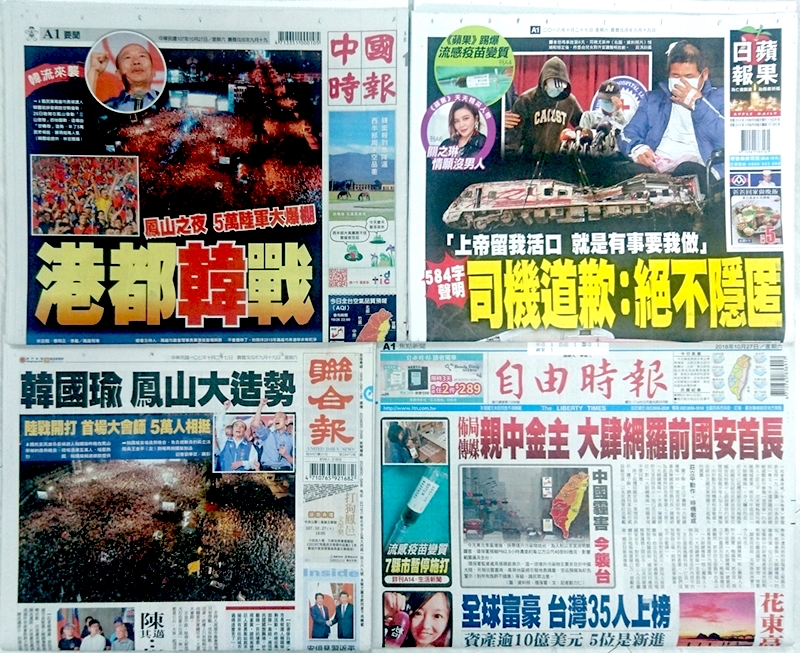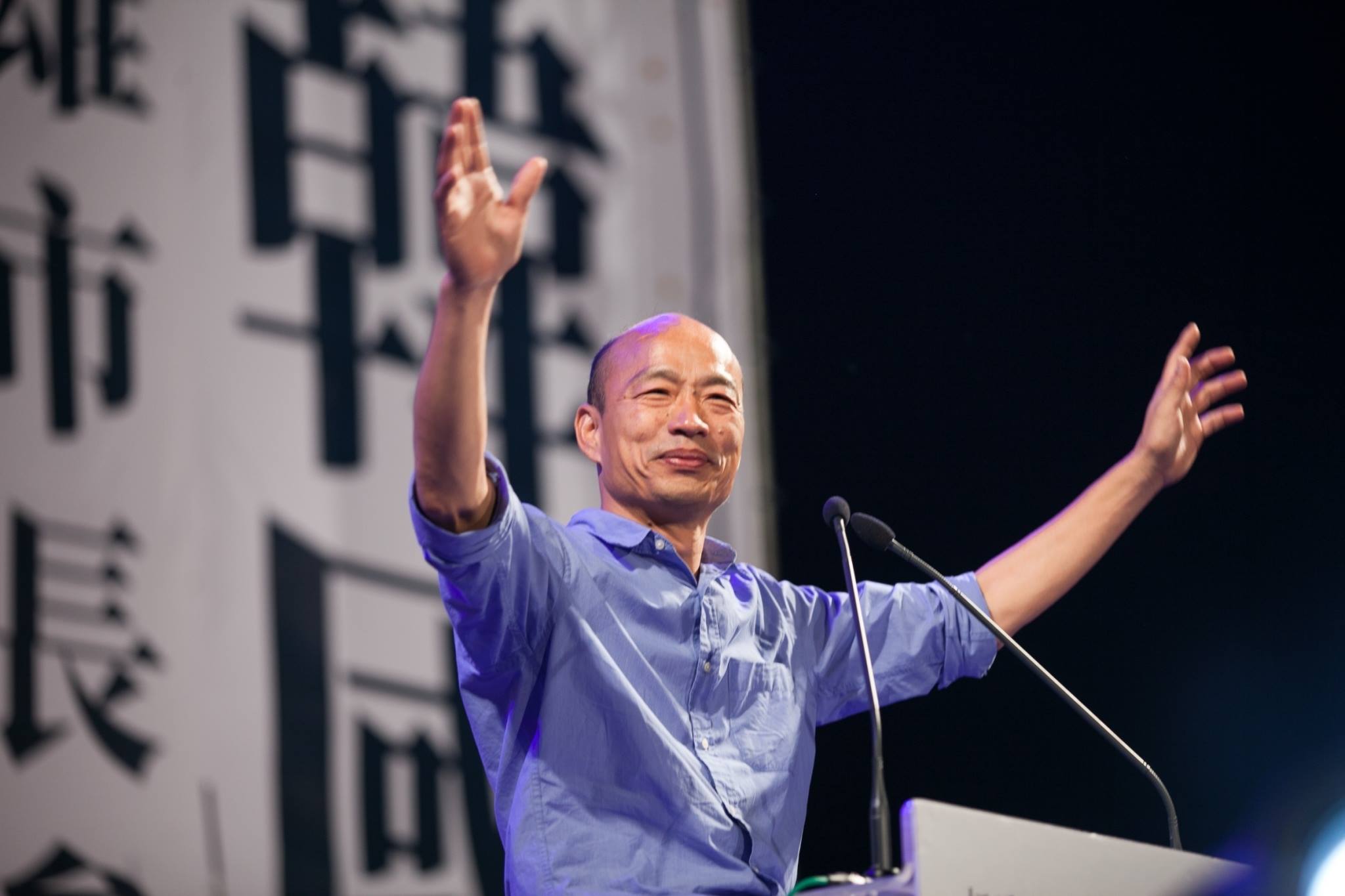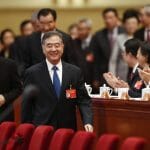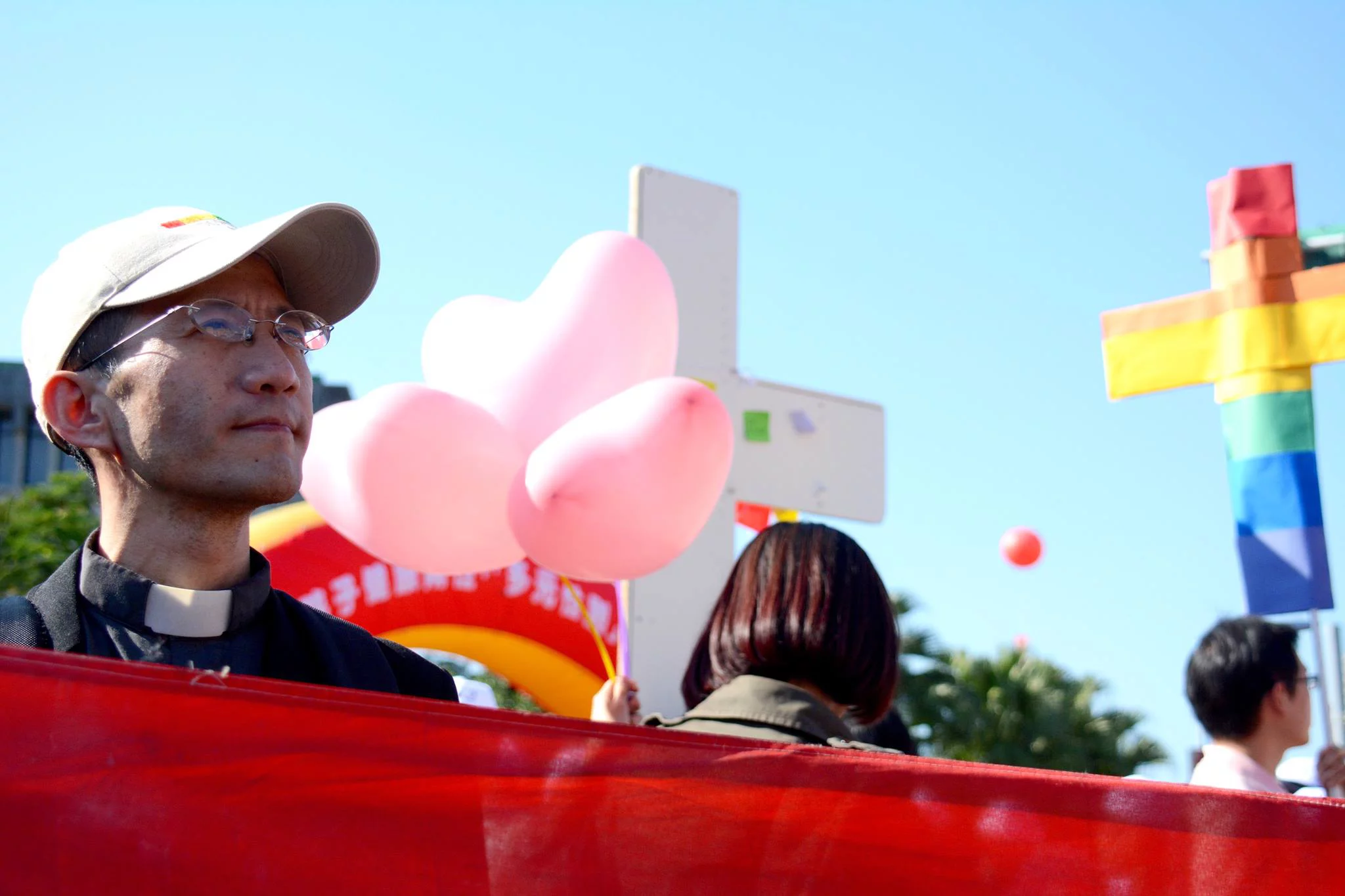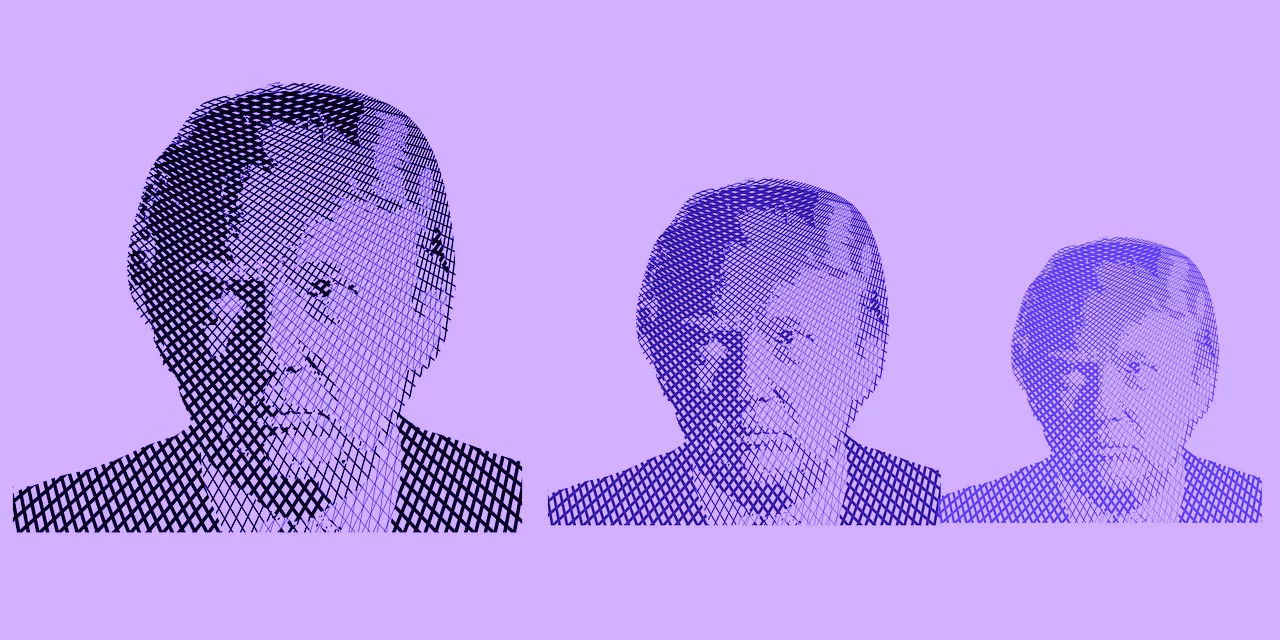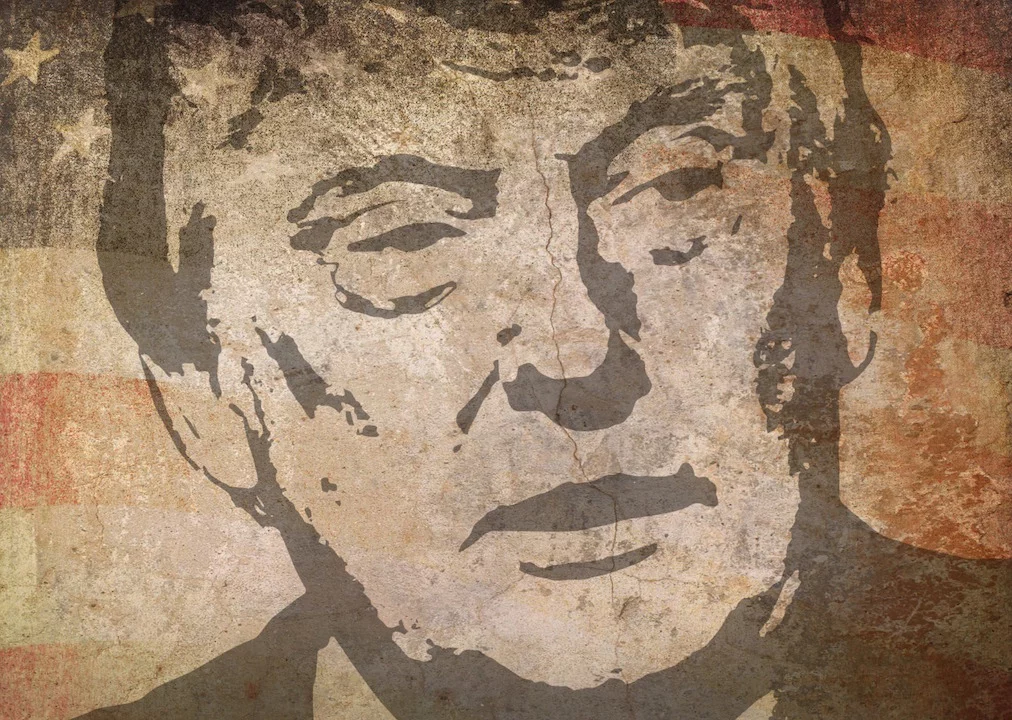Seven Taiwanese American Christians tell us how their faith can be reconciled with support for LGBTQ rights, including same-sex marriage.
LGBTQ rights are a controversial topic within the church, both in Taiwan and abroad. In both Taiwan and the United States, Christians have recently led and participated in anti-LGBTQ movements.
As progressive Christians, we believe the Church should advocate for LGBTQ equality. We also believe that those Christians who oppose gay marriage have resorted to harmful and unjustifiable practices to further an extremist, (American) colonialist, anti-scientific agenda. Claims of “gays converting straight people” and “AIDS being a curse of God” must appeal to fear because there is no rational argument for them. These biased and poorly conducted studies by well-funded religious organizations have been disproven time and time again. Something that is right and true should not have to resort to fearmongering and spinning lies to prove its point.
We are a group of progressive Christians with a particular affinity for Taiwan. We come from all backgrounds: mainline and evangelical, clergy and laity, gay and straight. Some of us were raised Christian, and some were converts later in life. Through our stories, we hope to convince you, our Christian friends, family, and peers, that advocating for gay rights is not a betrayal of your faith. It is a testament to the Christian duty of loving your neighbor, doing good, seeking justice, and correcting oppression.
We are not progressive because we have lost our faith, or because we take our faith less seriously than our conservative peers. On the contrary, many of us have come to identify as progressive Christians precisely through examining, re-examining, and reconstructing our faith. Many of us saw that we were personally guilty — by public membership or private belief — of contributing to systems that deny the dignity of people not like us. In Taiwan, members of the LGBTQ community are still excluded from institutions that others are able to take for granted, whether in social or legal recognition as a family unit. We hope you will join us in confronting these systems and reclaiming the Christian purpose as a force for good.
These are our stories.
* * *
Cindy Brandt (王維歆)
Progressive Christian writer living in Taiwan
I’m writing to: Christians
My Story: I was born and raised in Taiwan. My family was non-religious, but like many other Taiwanese parents, wanted the best education options for me and sent me to an American school founded by missionaries. I became a Christian at the young age of 12. As a child, there were a lot of things I did not understand. I was not aware of the cultural context from which the American missionaries operated, and how much of the Christian faith they brought to me was wrapped up in some of the culture wars of the West. I was raised to believe that being a Christian meant I was to be anti-abortion, anti-gay, anti-evolution, and to uphold a strongly exclusionary stance on salvation and faith. The way we engaged Buddhism, Taoism, and other folk religious people of Taiwan was from an “evangelical” perspective, meaning we were compelled to convert them instead of listening, empathizing with, and partnering with them for the common good.
It has taken me many years of my faith journey to unpack those nuances, and now I embrace a much more progressive stance on most social issues as well as a more radical inclusivity when it comes to Christian theology. And although many in my situation would reject the evangelical label, I feel that evangelicalism was the place of birth for my faith, and it shapes the lens through which I tell my story. There were and continue to be some worthwhile elements of that culture that I cherish.
At a time when Taiwanese society is fighting for a marginalized group, for LGBTQ people to have equal rights, having the Christian Church lead the opposition is shameful.
What I wish for the Church in Taiwan is to remember the powerful influence of the West in the Christian culture in Taiwan, but that power is not always good. As a follower of Jesus, we ought to learn to pay attention to the voices and the work of those with the least power. At a time when Taiwanese society is fighting for a marginalized group, for LGBTQ people to have equal rights, having the Christian Church lead the opposition is shameful. The gay people in my life have actually helped point me to Jesus by their persistent faith — no one has the authority to keep them away from God. We need to forge our Christian identity by building connections with people of other faiths, and instead of evangelizing them with our agenda, to make meaningful relationships in which mutual flourishing, and not boundary marking, becomes the mark of our society.
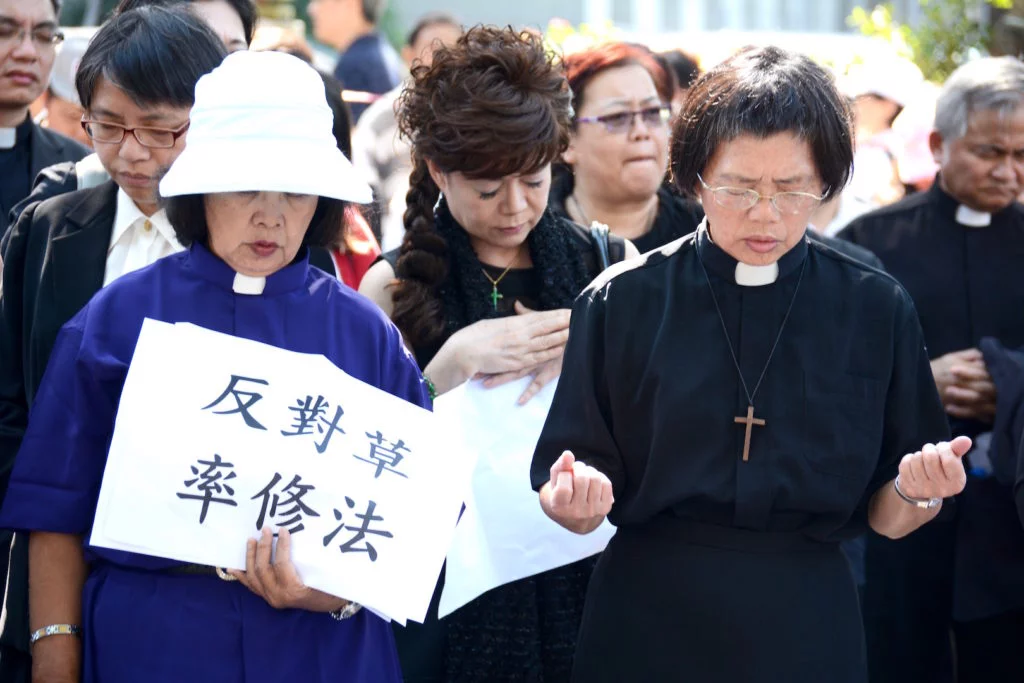
Religious groups pray during a protest against same-sex marriage outside the Legislative Yuan in Taipei on Nov. 17, 2016 (Photo: J. Michael Cole)
Charing Wei-Jen Chen (陳煒仁)
Taiwanese studying Sacred Text and LGBTQ issues at Chicago Theological Seminary
I’m writing to: my Christian friends in Taiwan
My Story: This is my second year studying in Chicago. This winter has been uncomfortable in many ways — not only the changing weather and extreme cold, but a changing political climate that strains diversity and equality. A business tycoon devotes himself to building a wall and asks those on the other side to pay for it; to banning certain religions regardless of their legal immigration status; to sweeping deportations without regard for human life and welfare; to giving a voice to those who support conversion therapy (now waiting to pounce on this new opportunity); to putting education in the hands of one dedicated to destroying public education. This show has just begun. One of my professors noted that the strides made towards religious tolerance and equality over the past 60 years have vanished in the course of two weeks, and each and everyone of us may feel its repercussions.
At the same time, there have been several interesting, heartening movements that have spawned from resistance to this new reality: women in the U.S. protested and declared their intention to resist any unjust orders, lawyers congregated at airports to provide assistance to those prevented from entering the country, civic organizations have started to train and proclaim their commitment to related issues, LGBTQ and cross-denominational religious entities have coordinated closely to discuss strategies for resistance. One report stated that the state of democracy in the United States is not decided by one man in the White House, but depends more on the efforts of civil society. The report predicted an increased engagement with public affairs, greater connection with others, a greater commitment to advocate for the oppressed, and a renewed search for the meaning of equality and freedom. This renewal might be three years and eleven months from now, or later.
Following the protests by the True Love Association in 2011, Christianity in Taiwan became synonymous with opposing equality, damaging justice, false witness, irrationality, arrogance, and oppression of the marginalized.
Following the protests by the True Love Association in 2011, Christianity in Taiwan became synonymous with opposing equality, damaging justice, false witness, irrationality, arrogance, and oppression of the marginalized. The image of Christians that once prevailed — that of being “agents of love and peace” — is now an illusion. Instead, we have the protests and related incidents by the Association of Promoting Family Value in 2013; the creation of the Christian political party Faith And Hope League in 2015; and the movements that have mobilized to oppose the same-sex bill in 2016. This is the new image of Christians in Taiwan. Because — not in spite of — this, let us as Christians embark on the journey to self-reflect, reform and re-engage in a new way with the context in which we live, fighting back against the hatred in our midst. Though many may pray to let this cup pass from them, there are surely those who pray for strength through the sweat and tears, those who hope to keep marching for justice on the road of life. I wish we will walk in this way.
David Shinn (蔡偉修)
“1.5-generation” Taiwanese American, husband, father of two young men, pastor, and runner living and serving in Minneapolis, MN
I’m writing to: fellow Taiwanese-American clergy, clergy of the Presbyterian Church of Taiwan
My Story: Between the two pastoral calls from the suburbs of Detroit, MI, to Minneapolis, MN, I had the privilege and joy to take a four-month sabbatical at the Tainan Theological Seminary in the winter of 2015. Truly by the generosity of President Wang and the faculty of the seminary, my experience was filled with blessings due to their academic insight, intellectual acumen, spiritual teaching, and absolute commitment to the justice and peace of Jesus Christ. It was such a highlight for me in two ways. First, it was the longest duration of residence since I left the motherland when I was 11. Secondly, it was the first time I attended classes in a Taiwanese seminary. The cultural, spiritual, and theological learning couldn’t be understated.
In the U.S. seminaries, we talk about Asian and Asian American theology, contextual theology, and indigenous theology. That, with all due respect, can be rather sterile and disconnected. While in Taiwan, no longer the subject of theology in some distant time, land, and people, I was sitting in the classroom full of students whose primary language, culture, and theological foundations were the full embodiment of the theological subject. No textbooks I have ever read in the U.S. could amount to even 10% of my total experience with the faculty and students of Tainan Theological Seminary. To them, I am immensely grateful.
The apex of the experience is the subject of this humble submission. At the Tainan Seminary, I witnessed the clarion of commitment to justice, peace, and hope in the gospel of Jesus Christ. As people who have been subjugated to numerous annexations by the foreign powers, the people of Taiwan understand what life is like under oppression. The students, in fact, were sensitive to inauthenticity and to any form of oppression in the name of a supposed power, whether it be of divine or political origin. In particular, they were thoroughly committed to basic human rights for the LGBTQ community. For too long, they have lived with indignity inflicted by the political and ecclesial powers. It was time for the country and the church to stand up for the LGBTQ community, they said. As a nation, Taiwan is in the midst of recognizing marriage equality for same sex couples. As a denomination, the Presbyterian Church of Taiwan is wrestling with ordination standards to include the LBGTQ community.
The commitment to justice for the LGBTQ community was evident among the student body of the seminary. Many, unprompted by me, expressed an urgency and desire to learn from the journey of my own denomination, PCUSA. They wanted to know what the Presbyterian Church of Taiwan could learn from the PCUSA in its 30 years of discernment process. Ultimately, they wanted to uphold the teachings of Christ when Jesus said, “If you continue in my word, you are truly my disciples; and you will know the truth, and the truth will make you free.” John 8:31b-32.
We stand for the immovable foundation of God’s love. It is from the broadness of God’s love, the arch of God’s justice, and the harmony of God’s beloved community that we are fighting for the rights of our LGBTQ sisters and brothers.
With the rise of nationalism across much of the developed world, we are witnessing outward displays of discrimination, racially charged hate speech and vandalism, anti-immigrant rhetoric, and anti-LGBTQ legislation. We are witnessing, as some have pronounced, the last gasp of the soon to be bygone ideology. I am not so convinced. In fact, it is time for us to be even more vigilant in promulgating the love of Christ. We stand for the immovable foundation of God’s love. It is from the broadness of God’s love, the arch of God’s justice, and the harmony of God’s beloved community that we are fighting for the rights of our LGBTQ sisters and brothers, the rights of the millions of refugees, the rights of undocumented workers, the rights of all indigenous peoples, and the rights of all who are oppressed. I hope you will join us in this effort to spread God’s love for all people.
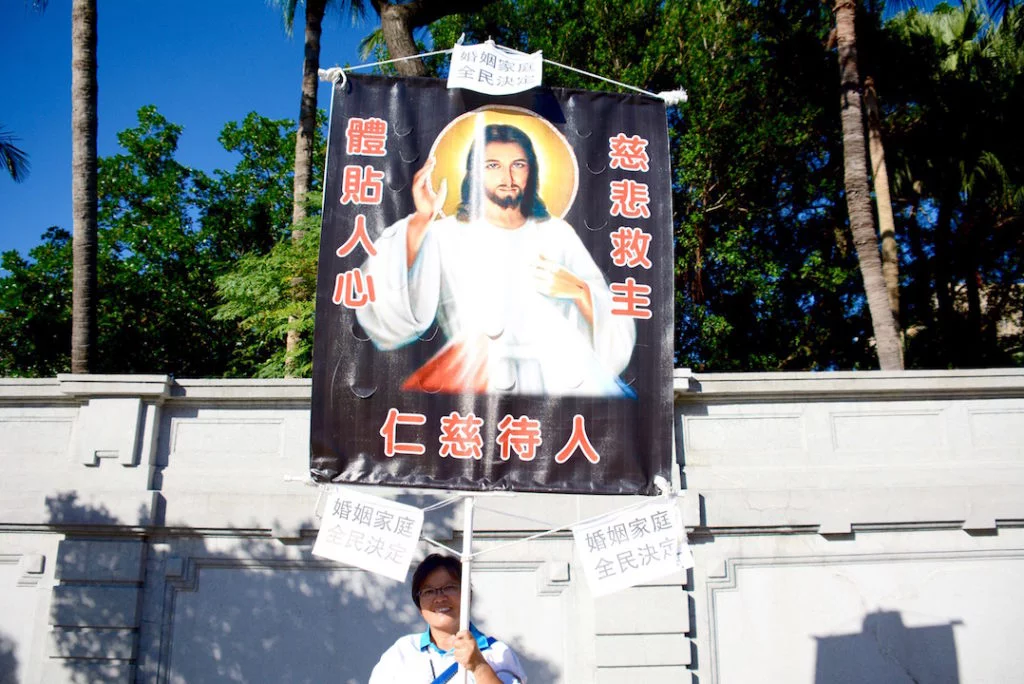
An opponent of same-sex marriage holds up a banner during a protest on Ketagalan Boulevard in Taipei on Nov. 13, 2016 (Photo: J. Michael Cole)
Gloria Hu (胡慧中)
2nd-generation Taiwanese-Canadian living in New Jersey
I’m writing to: my Christian friends and relatives in Taiwan, Presbyterian Church of Taiwan leadership
My Story: Like many second-generation kids, I was raised hearing about the courage and moral fiber of Taiwanese Christians who lived under martial law and their advocacy for those oppressed by the Kuomintang (KMT) regime — to preserving the Taiwanese language, indigenous rights, for free elections and the self-determination of the Taiwanese people. Being raised with these stories, my faith was shaped early on by a sense of responsibility to be a friend and ally to those without access to the full resources freely offered to others, whether because of their sexual orientation, their religion or culture, or their political views.
In college, the evangelical groups I encountered would often shy away from political topics, saying their focus was on salvation through belief in Christ, the only source of redemption. I was unable to reconcile this vision with the faith culture in which I was raised. How could it be that a loving God, who came to redeem humanity, was indifferent to the ways we caused others to suffer? How could it be that God created humanity so doomed to fail that improving our own societies was nothing but a futile — perhaps even arrogant — effort?
How could it be that a loving God, who came to redeem humanity, was indifferent to the ways we caused others to suffer? How could it be that God created humanity so doomed to fail that improving our own societies was nothing but a futile — perhaps even arrogant — effort?
Although recent events in the United States have been disheartening, they have also made one thing clear: faith IS political. This is not about the separation of church and state as institutions. This is about the individual — about that empathic, innate tug that calls each of us to speak out for the marginalized, for the downtrodden, for those who do not look, believe, or live as we do. This is what my faith calls me to, and I hope that the Church that so shaped my worldview — the Presbyterian Church of Taiwan — will continue to give me hope today by advocating for LGBTQ rights, transitional justice, and equality for all Taiwanese.
Melinda Tanng Chen (陳方俐)
2nd-generation Taiwanese-American, mother of three girls, living in New Hampshire, child of Presbyterian pastor
I’m writing to: Friends formerly and currently in TPCs in the USA, Presbyterian Church of Taiwan leadership
My Story: I am a child of a multigenerational family of Taiwanese Presbyterians. I grew up in Caucasian mainstream churches, mostly Presbyterian. When I was in college I attended a Taiwanese church that hired interns from Moody Bible Institute to preach during English worship services and teach Sunday School. Their conservative theology shaped my perspective, which at the time was newly developing. During graduate school I joined a Navigators campus fellowship, and began attending an Evangelical Free Church branch near school. I would say that my perspective was profoundly influenced by these two groups. I am indebted to them for teaching me the joy of reading the bible, of studying it, even memorizing verses, so they were always with me. However, both groups, some of whose members overlapped, were quite conservative (my dad would say fundamentalist) in their theology. By the time I graduated I held the conviction that abortion was murder, homosexuality was a sin, women could not teach or hold positions of leadership over men, and that people had to “accept Christ,” in an intentional moment to be saved.
I will not go into the details of my journey since those days, it being over 20 years in the making. During some of those years I was a member of a Taiwanese Presbyterian Church, Caucasian Presbyterian Church with a Taiwanese congregation, and am now a member and an elder in a mostly white Presbyterian church in northern New England. While I still believe abortion involves terminating a life, I am pro-choice. I do not believe that homosexuality is a sin, I believe women are called to serve as leaders and preachers, and that the Christian journey is a long one and cannot be distilled to a single moment.
Living in New Hampshire I am now a great distance from the doings of Asian churches, so I only know what I hear from friends and family. I am greatly concerned over the inordinate amount of time and energy spent by the leadership, urging members to make certain political choices. These choices are particularly concerning when talking about the LGTBQ community because they deal with discrimination and the withholding of certain civil rights that are granted freely to the rest of society. Many of these churches were quite fond of the WWJD (What Would Jesus Do) bracelets in years past. I think they should perhaps begin wearing them again when they exercise their civic duty. What would Jesus do? Moreover, What would Jesus say? Jesus was all about loving the marginalized. He was not concerned with laws that denied people civil rights. He spent his three-year ministry loving and ministering to God’s people, showing us what the kingdom looks like. Isn’t that the example we should be following?
The Presbyterian Church of Taiwan has historically ALWAYS stood for human rights, self-determination, and democracy. I hope they would remember the legacy for which they have been held up, and speak accordingly to this issue.
Taiwan’s legislature is currently debating marriage equality. The Presbyterian Church of Taiwan has historically ALWAYS stood for human rights, self-determination, and democracy. I hope they would remember the legacy for which they have been held up, and speak accordingly to this issue. Members of the LGBTQ should be give the same rights as everyone else. Not special rights, but the same rights.
Rachel Lei (雷懿楓)
I’m Rachel Lei, and I’m a Pharisee.
I’m writing to: Followers of Jesus
My Story: I love the Bible. I love studying it, by myself or with others. I find it endlessly fascinating and deeply personal; I have consistently looked to it for comfort, guidance, and wisdom.
After months of discernment with Christian mentors and my family, I followed what I felt to be a clear call from God to ministry. I was prepared for full-time ministry to be hard. What I was not prepared for was the barrage of criticism — from both strangers and family friends from church — questioning that I could be called to teach the Bible. Their reasoning went like this:
1) Clearly the Bible does not allow women to teach (1 Timothy 2:12);
a) Sure, Paul praised women teachers elsewhere, but the plain meaning of 1 Timothy 2 is clear, so
b) better err on the side of caution
2) Therefore, God couldn’t possibly have called you, a woman, to teach the Bible;
3) You are, at best, misguided, and at worst, knowingly sinning;
4) Nothing personal, that’s just what the Bible says.
I was stunned. These Bible-loving Christians never asked me why I felt called. They knew next to nothing about me, much less anything about how I read the Bible or how I discerned God’s calling on my life.
Then I learned that the Pharisees loved the Bible. They opposed Jesus because of their great respect for the Bible. We Christians love to rail against the Pharisees. We marvel at their hardness of heart, the certainty with which they held their righteousness, their stubborn blindness to the work of God in Jesus. We read Jesus’s condemnation of them with glee. Clearly, the Spirit of God was not in them.
Or was it? Sure, we can say “they completely misunderstood God’s commandments” — but only in retrospect. They didn’t think they were wrong. They thought Jesus misunderstood God’s commandments.
I sincerely believed homosexual conduct was sinful. I would have opposed same-sex marriage. As recently as 2007, I dismissed Christians who appealed to experience in their queer-affirmation. Nothing personal, I was just respecting the Bible. And I had the seminary diploma to prove it.
“You have a fine way of rejecting the commandment of God . . . ! For Moses said, ‘Honor your father and your mother’ . . . But you say that if anyone tells father or mother, ‘Whatever support you might have had from me is Corban’ (that is, an offering to God) — then you no longer permit doing anything for a father or mother, thus making void the word of God . . . .” (Mark 7:9-13)
Oh. My. God. I. Am. A. Pharisee. Whatever listening ear queer and queer-affirming Christians might have had from me, I had offered to God in my sincere effort to honor the Bible and ruled out actually listening to their stories — making void Jesus’s clear prioritization of the needs of flesh-and-blood people. “. . . the [law] was made for humankind, not humankind for the [law]” (Mark 2:23-27, 3:1-5, 5:25-34, John 5:1-18, etc.), not to mention “love your neighbor as yourself”. And I should have known to do better than how people treated me.
Until quite recently I did not have any LGBTQ friends. Or rather, I didn’t know I had Christian LGBTQ friends because they did not feel safe with me. And so I never heard their stories, how they experienced life, the church, the Bible, God.
Until quite recently I did not have any LGBTQ friends. Or rather, I didn’t know I had Christian LGBTQ friends because they did not feel safe with me.
Perhaps many Taiwanese Christians will chalk my queer-affirmation to 25 years living in the U.S. and to being co-opted by liberal Western sexual mores. If anything, the reverse is true. We speak because we who suckled at the breast of U.S. evangelical churches have seen the fruit of Pharisaism — four out of five White evangelicals voting for Donald J. Trump.
“Dehumanization is to speak of [minorities] only in the context of [public policy], rather than as people who have families, careers, and dreams . . . . It is dehumanization that allows us to judge one another before we even hear a word out of one another’s mouths.”
We followers of Jesus need to take these words to heart. Because ultimately, the point I want to make is not how the Scripture can be interpreted. That alone keeps us in the mode of intellectual exercise. To speak of LGBTQ only in the context of family values and sin is dehumanization. The question that we have to ask ourselves is: Are we so sure we’re reading the Scripture correctly that we’re willing to persist despite the cost to real people and the name of Jesus? Is our “obedience to the Bible” letting us off the hook from the perhaps harder work of loving flesh-and-blood people?
I’m Rachel Lei, and I am a Pharisee. But may Jesus not say to me “Woe to you . . . ! For you tithe mint, dill, and cumin, and have neglected the weightier matters of the law: justice and mercy and faith. . . You strain out a gnat but swallow a camel!” (Matthew 23: 23-24). It is not too late.
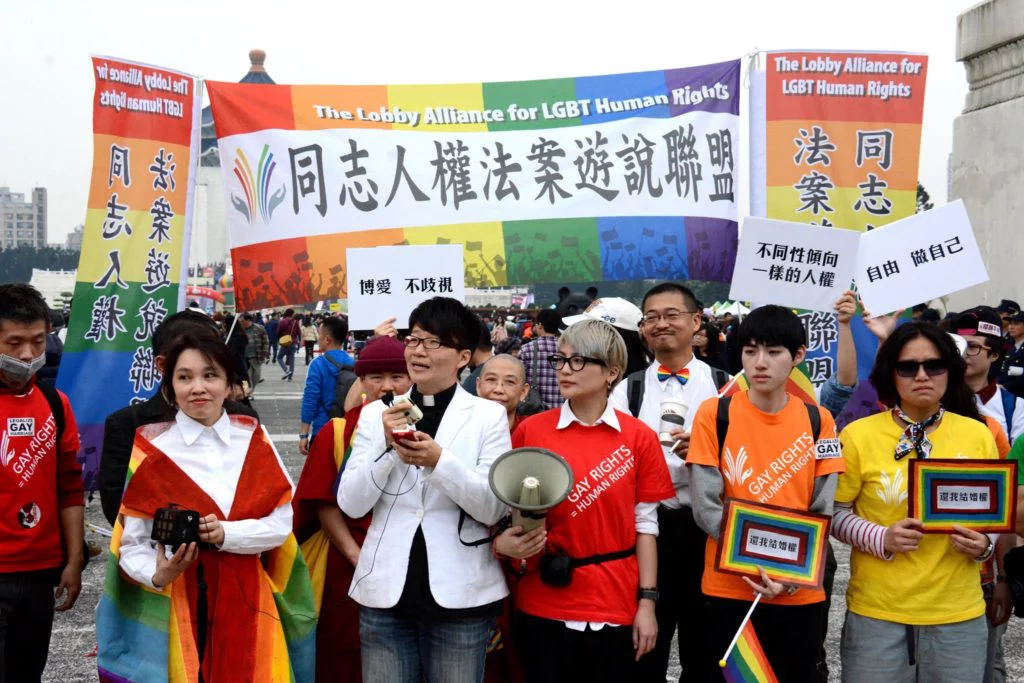
Supporters of same-sex marriage, religious figures among them, hold a counter-protest at Liberty Square in Taipei on March 16, 2014, as opponents hold a large rally nearby (Photo: J. Michael Cole)
Timothy Tseng (曾祥雨)
Pastor of English Ministries at a Taiwanese Church in the San Francisco Bay Area, affiliate of the Asian American Center at Fuller Theological Seminary, independent scholar
I’m writing to: Asian-American kids growing up in the same environment as I did
My Story: Like many Chinese or Taiwanese American Christians, I was raised believing that the only way to be an authentic follower of Jesus Christ was to be politically apathetic (or conservative) and theologically fundamentalist. Liberal Christianity was denounced as heretical and progressive politics as godless even though, as a boy, I didn’t understand what any of this meant. But when I was a teenager, I became more aware of the immense social ills and injustices in the world. As my church helped resettle hundreds of refugee families from Vietnam and Cambodia in the late 1970s, my heart was wrenched by how many lives were torn apart by war. The murder of Vincent Chin in 1982 also shook me deeply; I then realized that the challenges facing racial minorities in the United States included anti-Asian American racism. Even though I’ve always appreciated being nurtured by the Chinese evangelical community in New York City, whose spiritual devotion and brotherly and sisterly love was second to none, there was a tremendous chasm between my faith and its applicability to the troubling problems in society.
Therefore, I am immensely grateful to my father (who planted the Chinese church that I grew up in), the InterVarsity Christian Fellowship, and the American Baptist Churches (who introduced me to an incredible diversity of African American, Hispanic, and Asian American believers). They encouraged me to explore the questions that were so deeply troubling. Through their support, I became acquainted with the God of Psalm 72:12-14 (NRSV):
12 For he delivers the needy when they call,
the poor and those who have no helper.
13 He has pity on the weak and the needy,
and saves the lives of the needy.
14 From oppression and violence he redeems their life;
and precious is their blood in his sight.
This God called me into ministry and theological education at Urbana 84, after which I was exposed to a prophetic Christianity that worshiped a God who cared deeply about the pain caused by structural sin and idolatry. This is the God of Moses, who redeemed the people of Israel out of the oppression of slavery. This is the God of Jesus Christ, who taught us to care for the least of these. This is the God of Bartolomé de las Casas, who fought for the humanity of Native Americans enslaved by the Spanish Empire. This is the God of the 19th century British and American abolitionists, who struggled to end the African slave trade. This is the God of the social gospel, who battled the brutality of unchecked industrial capitalism in early 20th Century America. This is the God of the Civil Rights Movement and all Christians today whose ultimate hope is in the emerging Reign of Christ! And I believe this God also defends LGBTQ people who are outcast and so deeply wounded by our society and by so many people in our churches today.
You might also like
More from Society & Culture
Media and Free Expression in Taiwan Are Under Attack: What Can be Done?
How can we avoid the imposition of a blanket silence which can only empower our enemies and damage our democracy? …
What Makes the Nation?
What sets Taiwan apart, and what gives it its value, is what it stands for — its national narrative, the …
What Happened to Taiwan’s Support for Same-Sex Marriage?
Despite signs of LGBT support in Taiwan, many analysts and commentators ignored the number of Taiwanese who had no set …
